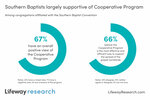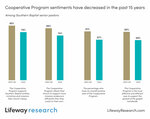



BRENTWOOD, Tenn. — The large majority of Southern Baptist pastors believe the Cooperative Program supports the ministries and missions their church values and allows their church to support more missions endeavors than they could on their own.
The Cooperative Program is Southern Baptists’ unified plan of giving through which cooperating Southern Baptist churches give a percentage of their undesignated receipts in support of their respective state convention and the Southern Baptist Convention missions and ministries.
A survey of Southern Baptist congregations conducted by Lifeway Research in the fall of 2023 found 2 in 3 congregations have an overall positive view of the Cooperative Program (67%) and believe the Cooperative Program is the most effective and efficient way to support the spread of the gospel worldwide (66%).
Two in 3 (66%) participating congregations say they give 5% or more of their church budget through the Cooperative Program. And 3 in 4 (76%) say their church’s budget percentage given through the Cooperative Program has increased or stayed the same over the last five years.
“We are grateful for the significant number of churches that maintain Cooperative Program giving as a convictional priority,” said Jeff Iorg, president of the SBC Executive Committee. “There are so many competing demands—from pressing local ministry needs to national economic challenges—yet these churches stay the course year-by-year. These dependable gifts are the financial backbone for the entities of the Southern Baptist Convention.”
While Southern Baptist congregations continue to faithfully support the Cooperative Program and its purpose, sentiments about the Cooperative Program have shifted since 2007-08 when Lifeway Research conducted a similar study. The share of pastors who have a positive view of the Cooperative Program decreased from 81% in 2007-08 to 67% in 2023. In 2007-08, 80% of pastors described the Cooperative Program as being the most effective and efficient way to support the spread of the gospel worldwide, while only 66% said the same in 2023.
Nearly 8 in 10 (79%) say the Cooperative Program supports Southern Baptist entities, ministries and missions their church values. That’s down from 90% in 2007-08. Nearly 3 in 4 (74%) say the Cooperative Program allows their church to support more missions endeavors efficiently than they could on their own, compared to 86% who said the same in 2007-08.
In the latest study, 9 in 10 (91%) congregations indicate the Cooperative Program’s objective to send and support missionaries in North America and around the world is very or extremely important. Slightly fewer say it’s very or extremely important to educate and equip pastors, missionaries and other ministry leaders (85%) and to provide resources to plant churches in North America and around the world (84%).
More than 3 in 4 congregations (77%) say it’s very or extremely important the Cooperative Program supports missions and ministries in their state convention, and 68% say addressing social, moral and ethical concerns of our faith and families is very or extremely important.
“The objectives of the Cooperative Program still resonate with Southern Baptist congregations,” said Scott McConnell, executive director of Lifeway Research. “The gospel is the motivator for cooperation that is seen most clearly in sending and supporting missionaries, providing theological education and church planting.”
Southern Baptist congregations report the following benefits come close behind in being either very or extremely important:
Slightly more than half of Southern Baptist congregations (51%) say protecting churches from direct funding appeals by entities is either a very or extremely important benefit to their churches. And two-thirds (68%) of those that say this is a very or extremely important benefit agree this currently describes the Cooperative Program.
When asked to indicate their level of agreement with the statement “our church is pleased with the direction of the SBC,” over half (56%) agreed, 33% disagreed, 10% said neither agree or disagree and 2% said they didn’t know. Seven in 10 Southern Baptist congregations say their church’s satisfaction with the Cooperative Program depends on their satisfaction with the overall direction of the SBC (70%).
“Congregations that don’t give through the Cooperative Program are the most likely to disagree that the positive statements in the survey currently describe the Cooperative Program,” said McConnell. “The majority of these congregations that currently do not give to the Cooperative Program indicate they had given in the past five years, but a third have not.”
___
The SBC’s Cooperation Group initiated a survey of all Southern Baptist congregations to collect data that would provide insight on churches’ understanding of and partnership through the Cooperative Program, as well as thoughts, feelings and perceptions about the Cooperative Program and stewardship. The study was administered by Lifeway Research and was sent to up to one email address on file for Southern Baptist congregations. For more information, view the complete report.